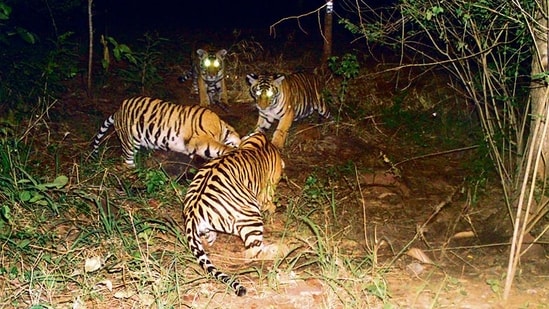“May your day be full of inspiration!”
“May your day be full of inspiration!”
Title goes hereSubheading goes here.
July 11, 2021
by Shruti Tomar and Anupam Pateriya Forest department officials in Madhya Pradesh have found that a tiger has been taking care of four cubs for the past month in the Panna Tiger Reserve after their mother died following a prolonged illness.
A study of camera trap pictures and videos, recorded over a month, has revealed that the tiger, P243, rarely left the territory of the cubs and was even killing prey for them, a forest official said. The mother of the four cubs died on May 15. Two days later, when the forest department located the cubs, they found the tiger taking care of them, US Sharma, the field director of Panna Tiger Reserve said. The forest department decided to set up cameras to study the behaviour the tiger was displaying. “The forest department observed the tiger and the cubs for a month between May 20 and June 20 by setting up cameras in the territory of cubs and found that the tiger killed animals and left [the prey] for the cubs,” Sharma said. Though he was roaming in a large area, he did not remain away from the cubs’ territory for more than two days, the forest department found in its observations. The department found that while the tiger was killing prey for the cubs, he did not take them along for the hunt. “The tiger made all the kills away from their territory and brought the dead prey for them,” the field director said. “On May 21, he killed a sambhar and shared the kill with the cubs. On June 6, the tiger killed a cow early in the morning a little distance from the cubs’ territory, but it did not eat it,” the forest department found through the photos. Wildlife experts called the tiger’s behaviour rare. “Such a phenomenon was seen in Ranthambore many years ago but is a rarest one. The forest department should do more study on change in behaviour of the tiger,” said SK Mandol, former chief warden of the forest. The next few months are very crucial for the survival of the cubs, experts said. “Next two to three months are very crucial for gaining skills for surviving the wild. The average weight of the cubs is around 50kg, which ideally should increase to 80-90kg by the time they turn one. Currently, all the four cubs are healthy and making good progress in the wild. They don’t seem to be stressed, instead they are playful and quite active. All four cubs are staying and roaming together,” said Alok Kumar, principal chief conservator of forest, wildlife. Content from
|
We envision a world in which people treat each other with respect and kindness, where we consider the Earth to be our home to care for and to enjoy. And we see that this world is in the process of emerging.
Positive News is a reflection of this widespread movement and tells its powerful stories. Vertical Divider
|








